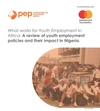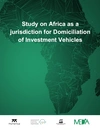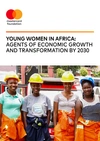Youth unemployment presents a significant socioeconomic challenge in Nigeria, prompting the initiation of various youth employment programs.
While many programs have undergone detailed impact analyses, there is a lack of empirical research on the implementation hurdles and how political inclusivity affects the distribution of program benefits. This paper aims to fill that gap using mixed research methods and primary data gathered through focus-group discussions and key informant interviews.
Despite the number of youth employment programs in Nigeria, they have not substantially decreased youth unemployment rates. These programs face obstacles such as a lack of governance framework and coordination, insufficient funding, limited institutional implementation capacity, inadequate oversight, political exclusion, poor attention to vulnerable groups, and a focus on isolated programs not integrated into long-term development plans. Addressing these issues is crucial to ensure that youth employment programs produce better results and effectively reduce youth unemployment.
PEP is partnering with the Mastercard Foundation for a three-year initiative on “What Works for Youth Employment in Africa.” It aims to provide evidence that can drive policy reform to increase youth employment in ten African countries.




